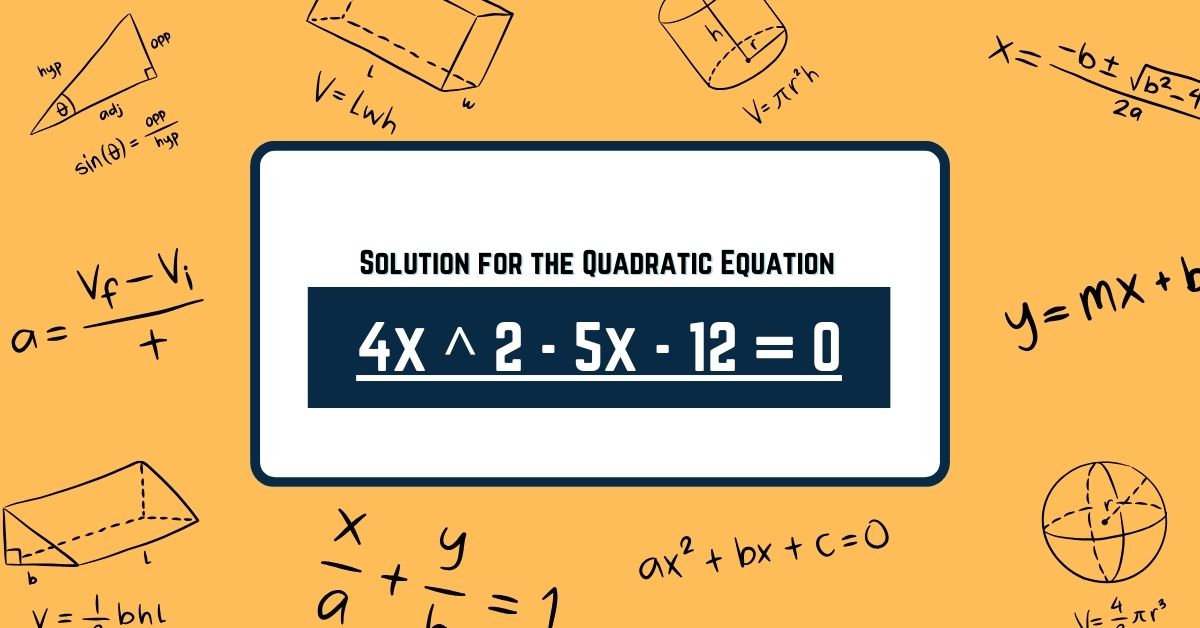4x^2 – 5x – 12 = 0
Unravel the complexities of the mathematical equation 4x^2 – 5x – 12 = 0 in this comprehensive guide. Discover its roots, factors, and solutions while gaining valuable insights into its applications.
Introduction
In the realm of mathematics, equations often present intriguing puzzles waiting to be solved. One such enigma is the quadratic equation 4x^2 – 5x – 12 = 0. While it may seem daunting at first glance, this guide will break down its components, explore its significance, and provide a roadmap to navigate its solutions.
Understanding the Equation
To comprehend 4x^2 – 5x – 12 = 0, it’s essential to grasp its structure. This quadratic equation is of the form ax^2 + bx + c = 0, where ‘a’, ‘b’, and ‘c’ represent constants and ‘x’ is the variable. In our equation, the coefficients are 4, -5, and -12 respectively.
Deciphering Quadratic Equations
Quadratic equations like 4x^2 – 5x – 12 = 0 often manifest in various real-world scenarios, including physics, engineering, and finance. Their significance lies in solving problems involving motion, optimization, and geometric shapes.
Analyzing the Roots
The roots of a quadratic equation are the values of ‘x’ that satisfy the equation, making the expression equal to zero. Understanding the roots provides valuable insights into the behavior of the equation.
Finding Roots through Factorization
One approach to finding the roots involves factoring the quadratic expression. By decomposing the equation into its factors, we can determine the values of ‘x’ that make each factor equal to zero.
Exploring Solutions
Solving 4x^2 – 5x – 12 = 0 requires employing various techniques such as factoring, completing the square, or using the quadratic formula. Each method offers a unique perspective on tackling the equation.
Utilizing the Quadratic Formula
The quadratic formula, (-b ± √(b^2 – 4ac)) / (2a), provides a systematic approach to finding the solutions of a quadratic equation. By substituting the coefficients ‘a’, ‘b’, and ‘c’ into the formula, we can derive the values of ‘x’.
Applications in Real Life
While quadratic equations may seem abstract, their applications extend far beyond the confines of the classroom. From determining projectile motion trajectories to optimizing profit margins, understanding 4x^2 – 5x – 12 = 0 can unlock a plethora of real-world solutions.
Engineering Applications
In engineering, quadratic equations find utility in designing structures, analyzing circuits, and modeling fluid dynamics. Engineers leverage these equations to solve complex problems and innovate new solutions.
Challenges and Pitfalls
Despite its utility, grappling with 4x^2 – 5x – 12 = 0 can present challenges, especially for those new to algebraic concepts. Common pitfalls include errors in calculation, misunderstanding of concepts, and overlooking alternative solution methods.
Strategies for Success
Overcoming these challenges requires patience, practice, and a willingness to explore different problem-solving approaches. By breaking down the equation into manageable steps and seeking clarification when needed, learners can conquer even the most daunting mathematical puzzles.
Conclusion
In conclusion, 4x^2 – 5x – 12 = 0 encapsulates the beauty and complexity of quadratic equations. By unraveling its mysteries, we gain not only a deeper understanding of mathematical concepts but also a newfound appreciation for the elegance of algebraic expressions.
FAQs (Frequently Asked Questions)
What is the significance of 4x^2 – 5x – 12 = 0? The equation represents a quadratic expression with applications in various fields such as physics, engineering, and finance.
How do you find the roots of 4x^2 – 5x – 12 = 0? The roots can be found by factoring the quadratic expression, completing the square, or using the quadratic formula.
Can quadratic equations like 4x^2 – 5x – 12 = 0 be applied in real-life scenarios? Yes, quadratic equations have practical applications in areas such as projectile motion, optimization problems, and structural analysis.
What are some common challenges when dealing with 4x^2 – 5x – 12 = 0? Common challenges include errors in calculation, misunderstanding of concepts, and difficulty in selecting the appropriate solution method.
How can one overcome challenges in solving 4x^2 – 5x – 12 = 0? Patience, practice, and seeking clarification when needed are key strategies for overcoming challenges in solving quadratic equations.
Where can I learn more about quadratic equations and their applications? Online resources, textbooks, and educational platforms offer a wealth of information and tutorials on quadratic equations and their real-world applications.



